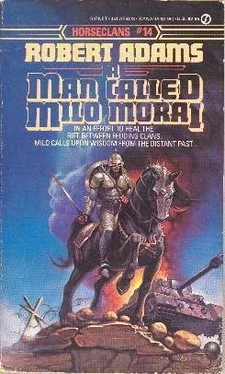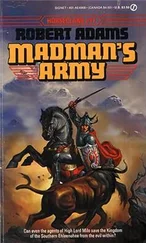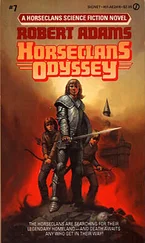Robert Adams - A Man Called Milo Morai
Здесь есть возможность читать онлайн «Robert Adams - A Man Called Milo Morai» весь текст электронной книги совершенно бесплатно (целиком полную версию без сокращений). В некоторых случаях можно слушать аудио, скачать через торрент в формате fb2 и присутствует краткое содержание. Жанр: Фантастика и фэнтези, на английском языке. Описание произведения, (предисловие) а так же отзывы посетителей доступны на портале библиотеки ЛибКат.
- Название:A Man Called Milo Morai
- Автор:
- Жанр:
- Год:неизвестен
- ISBN:нет данных
- Рейтинг книги:3 / 5. Голосов: 1
-
Избранное:Добавить в избранное
- Отзывы:
-
Ваша оценка:
- 60
- 1
- 2
- 3
- 4
- 5
A Man Called Milo Morai: краткое содержание, описание и аннотация
Предлагаем к чтению аннотацию, описание, краткое содержание или предисловие (зависит от того, что написал сам автор книги «A Man Called Milo Morai»). Если вы не нашли необходимую информацию о книге — напишите в комментариях, мы постараемся отыскать её.
A Man Called Milo Morai — читать онлайн бесплатно полную книгу (весь текст) целиком
Ниже представлен текст книги, разбитый по страницам. Система сохранения места последней прочитанной страницы, позволяет с удобством читать онлайн бесплатно книгу «A Man Called Milo Morai», без необходимости каждый раз заново искать на чём Вы остановились. Поставьте закладку, и сможете в любой момент перейти на страницу, на которой закончили чтение.
Интервал:
Закладка:
Then, overnight, their fortune was wiped out along with many another on Black Friday. Her attorney and financial adviser, who had been on that Thursday a multimillionare, shot himself in the head with a shotgun. Maggie’s butler did the same with a German pistol. With a rare prescience, she went down the following Monday and emptied what money lay still in her accounts out of the banks which soon were closed.
By this time, the children were really too old to have need of a nurse, so she retained only the cook and Nellie, the maid. She firmly insisted that her elder daughter, [ Sally, and her younger, Kathleen, spend most of their ! free time in learning the arts of housekeeping and cooking, for she anticipated and feared the day when there would be too little money left to pay for any servants at all. Herself, she dusted off her only marketable skill and secured a nursing jo,b in the nearby hospital; it was not much money, true, but it was steady and far better than nothing.
With two guest rooms and two more rooms of former servants sitting vacant and useless, Maggie O’Shea got the idea of taking in boarders, nurses, all of them. When, in 1934, Michael’s appointment to the United States Military Academy emptied yet another room, she had no difficulty in promptly filling it with another nurse, Miss Fanny Duncan.
In 1936, two more rooms became vacant. Joseph enlisted in the Navy and his twin, Sally, moved into the hospital residence hall to begin her nurse’s training. This meant that Maggie had to hire on a second maid, but there was space for another in the quarters that had once been the chauffeur’s over the garage, and with the combination of her salary, her husband’s pension and seventy dollars each week in paid rents, she could easily afford the extra employee. And so there were presently two more nurses in the house that certain of the more affluent neighbors were beginning to call “the Convent of Saint Maggie,” not that Maggie cared a fig. She had kept her house, kept her family together, adequately fed and clothed and even provided gainful employment for non-family household members, which was more than many another could say in these hard, bitter times.
Even crippled as he was, a living testament to the horrors of modern warfare, to the inherent dangers of a soldier’s life, Maggie often felt that the government should be paying Patrick far more than his pension for, if nothing else, his recruiting activities. He had gotten his eldest an appointment to the USMA, persuaded his youngest to enter the military, along with many another man and boy with whom he kad come in contact over the years. The old soldier had even gone after the nurses resident in his home and, at length, blarneyed one of them, Jane Sullivan, into entering the Army Nurse Corps.
Jane Sullivan’s room became vacant while Fanny Duncan was still nursing the mystery man, and it was Fanny who first got the idea, broached it to Dr. Guiscarde and, with his not inconsiderable help, convinced first Maggie O’Shea, then the man called Milo Moray.
“Look, Maggie,” Guiscarde had said, “we want to keep the patient in a sheltered environment for as long as necessary, and we want that environment to be as close as possible to the hospital. And it’s not as if he were some deadbeat or bum, anyway. No, he’s not employed yet, but in confidence I’ll tell you this: he paid a staggering bill for his hospital room, round-the-clock nursing and the bills of several doctors in full and in cash, to the tune of well over eight hundred dollars, and he’s still well heeled even after the outlay. His resources would allow him to pay your going rent for going on four years even if he never got a job.
“Although he still can’t remember his past life or even his own name, he’s a proven brain—brilliant. He speaks a score of languages at the least, fluently, too. Dr. Samuel Osterreich says that he has met darned few men who were as good at chess as is this patient… .“He let that last dangle enticingly, having been coached on that particular by Fanny Duncan.
“Well,” Maggie pondered aloud, “I’ve never taken in a man for a boarder before, but this man sounds like he … and poor Pat has had nobody living in to play chess with since the boys left. All right, doctor, I’ll take him on a trial basis. If he works out, fine. If it looks like he won’t fit in, I’ll have to heave him out. Okay?”
After his first meeting with Mr. Milo Moray, Pat O’Shea told him bluntly, “Mister, whatever else you was, you was a soldier, once, prob’ly a ofser. You just carry yourself that way, and b’lieve me, I knows. Most likely, the bestest way for you to get your mem’ry back is to re-up. ‘Course, with you not rememb’ring and all, you prob’ly won’t get your commission back right away, but when you ready to enlist, you just let me know. I’ll get you back in—I knows some guys, local.”
Milo—he was finally beginning to think of himself as Milo Moray, since that was what everyone called him, for all that the name evoked not even the faint ghost of a memory within him—tramped the streets for over two weeks, searching in vain for some variety of employment. There just were no jobs available, it seemed.
Pat O’Shea pointed out that the frustration would be every bit as bad or worse in another area. “It’s the same all over thishere country, Milo. A few folks thinks and says it’s bettern it was five, six years ago, but don’t look that way to me, no way. Bestest thing a man could do, I think, is to enlist. The Army’s a good life. Oh, yeah, it’s hard sometimes and a man don’t get paid much, but he gets his clothes and three squares a day, regular, and he don’t have to pay doctors or dentists nothin’, and once he gets him a few stripes, he’s in like Flynn, less he fucks up or suthin’.”
Dr. Sam Osterreich arrived at the O’Shea house shortly after dinner of a night. After a few games of chess with O’Shea, he took Milo aside and opened the briefcase he had brought along.
Shoving a wad of newsprint toward Milo, he said, “Read, if read you can, please.”
Two of the sheets were German newspapers, one was Russian, one French and one Italian. To his surprise, Milo discovered that he could comprehend all of them, and he began to read them to the psychiatrist, but was interrupted by a wave of the hand.
“Nein, nein , you do not understand. Translate them to me, please, if you can.”
When Milo had done so, had translated the gist of short articles from four of the five papers, Osterreich nodded brusquely and took back the papers.
“Enough. Gut, gut, sehr gut . A job you now haf, if still you need of one haf, meinfreund . You may vork here, in your home, or in an office downtown from where you must in any case go to be gifen the papers each week and to return the completed translations of the indicated articles. One penny per word will be paid for each accurate translation returned, and to be accurate, they all must, this very important is, Milo.
“The bulk of the papers will in German be, but some will in Russian be, or in French, Spanish, Italian, various of the Slavic and Scandinavian languages, Finnish, sometimes, Yiddish, Dutch, Portuguese and even Slovakian.”
Pat O’Shea had been shamelessly eavesdropping, and he now demanded, “Now, just a minute, doctor, what in hell you getting Milo mixed up in, anyhow? Some of thishere Bolshevik mess? I heard you just say some them papers was going to be in Russian!”
Osterreich shook his balding head vigorously. “Nothing of the sort, Mr. O’Shea. To a group of recent immgrants I have the honor to belong, to be an officer. Convinced we all are that in Europe a very bloodbath approaching is, a holocaust of such proportions as nefer seen in the world before has been. To alert the citizens and officials of this, our new homeland, we are now trying through means of issuing a monthly digest of signs culled from European newspapers. We do this at our own expense, for most imperative it is that our new, free, vonderful homeland be warned, be prepared and secure when starts does this conflagration, for in this war, coming, there no neutrals will be, we fear; all nations combatants will be and only the strongest vill survive it.”
Читать дальшеИнтервал:
Закладка:
Похожие книги на «A Man Called Milo Morai»
Представляем Вашему вниманию похожие книги на «A Man Called Milo Morai» списком для выбора. Мы отобрали схожую по названию и смыслу литературу в надежде предоставить читателям больше вариантов отыскать новые, интересные, ещё непрочитанные произведения.
Обсуждение, отзывы о книге «A Man Called Milo Morai» и просто собственные мнения читателей. Оставьте ваши комментарии, напишите, что Вы думаете о произведении, его смысле или главных героях. Укажите что конкретно понравилось, а что нет, и почему Вы так считаете.












